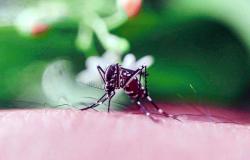
With 13,000 jobs generated throughout the province, fishing is the second economic activity in Chubut, behind oil, with an annual turnover of around 600 million dollars in exports. A sector that could generate even more economic development for the province, but is currently experiencing the challenges posed by changes in international demand. and the consequences of a conflict not yet fully resolved.
The economic importance of fishing in Chubut is also reflected in another national indicator, since according to sources in the sector, the catch of shrimp in front of its ports last year reached a third of the 250,000 tons obtained in the Argentine fishing ground.
Ignacio Torres highlighted the importance of public education in Argentina: “It has to be a priority”
“We had never been able to exceed 90,000 tons and last year we were able to do it,” said one of the men involved in the activity. Unfortunately, this year the same will not be achieved, because with all the conflicts we had, it is already a year to be forgotten.”
The development potential of the sector has a strong contrast with the data that showed the lack of understanding between business and union sectors, at the beginning of the season that was to be exploited from the port of Rawson.
Negotiations are currently ongoing, particularly with the SUPA union, which represents the dockers. With the SOMU, which includes the sailors, the agreements today seem a little further away.
The Forum on “Energy Transition and Green Hydrogen” enabled debates for development, industrialization and production in Chubut
As in any conflict, each party has its portion of truth and accuses the other party of wanting to keep more than what is due. However, there is also an external context that explains why the different positions may seem difficult to reconcile, unless the modification is accepted in that underlying context.
CHANGES IN WORLD DEMAND AND THE ECONOMIC EQUATION, WHICH FORCE YOU TO ADAPT
Those who know the activity explain that historically Rawson had important commercial value, because the entire kilo of shrimp was sold for around 6.5 dollars.
In this way, a high percentage of the catch was sold whole. However, in a market mainly marked by export, lhe changes in habits in global demand began to modify the economic equation.
The regional Forum on green hydrogen and energy transition began
The market began to turn towards ‘tail’ shrimp, which meant that the crustacean had to be decapitated to respond to this new consumer expectation.
The product, thus presented, improved its value, since it rose to 8 dollars per kilo. However, for fishermen and plants, the equation is less profitable than in the previous scheme. This is explained because to sell 1 kilo of tail, you need 2 kilos of whole shrimp. But now, instead of 13 dollars as they were obtained before for that same amount, they are currently only 8.5 dollars.
“That is, the price of the product is reduced by 33% as a result of these changes in habits,” the businessman continued explaining.
Added to this external factor is another, of internal origin. In the last 7 years, the joint ventures were adjusted for inflation, but at the same time that prices and salaries rose, the exchange rate was also adjusted, even with the delays or delays that the exporting sectors always questioned.
Prefecture seized more than a ton of marijuana in Patagonia with a value of almost 3,000 million
The change came in December, since, although at that time there was a strong devaluation of the peso against the dollar, from that point on the exchange rate remained quite still, in the face of inflation it will accumulate around 60% in the first 4 months of the year.
The devaluation data in December forces another consultation, linked to whether the jump in the dollar, which in theory was worth 370 pesos and went to 800, brought a significant improvement for the sector. However, the assessment is not correct: the export dollar was, in December, 630 pesos; And when the new government began, in addition to raising the exchange rate, it also raised withholdings on exports.
They seized a significant amount of packaged and fractionated fish for sale in Arroyo Verde
In conclusion, with 15% withholdings, at that first moment the export dollar rose to 670, which meant an improvement of around 8%. In January, withholdings were eliminated, which effectively led to a 30% improvement on the export dollar.
Since that moment, they warn in the sector, the exchange rate remained practically stable (with a micro-appreciation of only 2% per month), in the face of inflation that led to an increase in internal costs of around 70%. For this reason, they insist, the equation has lost much of its profitability.
THE COSTS OF CONFLICT
Up to this point, there are two factors that modify the scenario. The first, as said, linked to external demand. The second linked to the ups and downs of the national economy. There is a third element, also of external origin, that hits the waterline: the drop in international prices.
What is the price of bottles in the towns in the interior of Chubut
This impacted prices by around 20%, as a result of overproduction in Ecuador, with farmed lagoons, which In this way it produces 5 times more than the entire volume of the Argentine cauldron.
Faced with this situation, the fishing plants set a lower price compared to the ship, verifying that internal costs increase, but the value of the product decreases. The transmission pulley the boats that sold at $2.60 will now sell at $1.80, which means a drop of 30%.
As a consequence, a situation of intransigence between all parties ends up, which ends up explaining conflicts such as the one that occurred between November and February of this year, when practically the entire shrimp catching season was lost.
Vista accelerates its activity and adds a new driller in Vaca Muerta
The figures of the losses suffered by the sector as a consequence of this lack of agreement between the parties are eloquent. According to official records, Due to the non-payment of the fishing fee and Gross Income, in the months of November and February, when the conflict arose, the province stopped collecting just over 400 million pesos.
The amount of the figures grows even more when considering what was not produced and exported. If the previous season closed at just over 90,000 tons, this year it was reduced to 63,000, with a loss of approximately 27,000 tons.
UNRN took measures due to lack of budget: suspends activities to avoid suspension of classes
At 6,500 dollars per unit, this means about 175.5 million dollars that were no longer sold to the foreign market, when the previous year it had reached 585 million dollars.
The losses punish all parties, not only the companies, but the workers themselves, who receive their salaries based on a percentage of the fishing, as well as the provincial economy.
THE CHALLENGE OF FARMED PRAWN IN ECUADOR AND THE NEED TO ARTICULATE STRATEGIES BETWEEN COMPANIES AND UNIONS
The white flag in the face of so much conflict and economic losses of such magnitude involves the question of how the Chubut fishing sector could establish agreements, to adapt to the new demands of international demand and recover markets that are not guaranteed today.
Caleta Desarrollos: 25 years of experience in the real estate sector of Chubut
There are those who wonder if there could be pacts similar to those established in oil fields, where in times of crisis due to external issues certain downward conditions are accepted, until the activity resurfaces with new incentives and better distribution conditions. The reasoning does not point to a mere business-union bid, but rather to a basis of consensus for better use of the potential that Chubut has yet to develop in fishing matters.
For example, the ‘saturation’ of the international market with Vannamei shrimp produced in farms was mentioned. Ecuador, which in 2022 reached a production of 1 million tons, gaining buyers who previously opted for wild shrimp from Argentina. With a lower price, this product came out to compete strongly and threatens to take away larger portions of the Argentine shrimp supply.
Chubut will be presented at the Seafood Expo Global in Spain
When you think that practically a fishing season was lost in the province as a result of the lack of agreements due to not interpreting the changes in external demand, perhaps there are some points to be covered ‘as a team’ along this path, to improve the equation for all parties.
In Chubut they are already working with an international consulting firm to obtain a certification that provides differentiation to the wild Patagonian shrimp, which is also captured with sustainability criteria, in order to regain positions in demanding markets.
Chubut’s income falls in real terms: royalties held back by lower production and co-participation on the decline in the face of inflation
“We are in the final stage and if we obtain that blue seal, for sustainable fishing, from the consulting firm MSC, we could reach new markets and probably at better prices.” -Those who work on the subject are enthusiastic. We have been wanting to certify for years and it is a very long process, but we are close.”
This project includes the fishing plants with their epicenter in the province, with support from the companies that operate the fleet of vessels. This is a goal that could open the door to new opportunities, but surely requires a fluid dialogue, to establish the bases of support for a new productive framework, which can increase employment and production figures. which, although they are important, can still contribute much more to the provincial economy.





